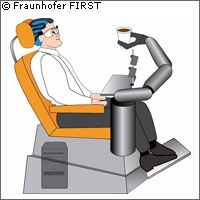EU project to showcase its robot arm at medical trade fair
A team of researchers have developed a robot control system based on electroencephalograph (EEG) signals, which could help paralysed people regain some independence. The EU-funded Brain2Robot project, developed at the Fraunhofer Institute for Computer Architecture and Software Technology (FIRST), involves a prosthetic robot arm that can be controlled through a Brain Computer Interface (BCI), which is combined with an 'eyetracker'. To establish the direction for the arm to move, the patient's eyes are monitored by two cameras mounted on a special pair of glasses. The actual movement of the robot arm, however, is initiated by a signal from the brain which is interpreted by the BCI. Electrodes attached to the patient's scalp are used to measure electrical signals from the brain. These are, in turn, amplified and analysed by the computer which can detect changes in brain activity. The machine can then carry out the will of the patient as dictated by their mental idea. The leader of the project, Dr Florin Popescu, said, 'The project is designed to help severely handicapped people cope with everyday life. The advantage of our technology is that it can directly convert intended movements into control commands for the computer.' Although initial research has focused exclusively on medical applications, there could be a whole range of further possible applications including automotive safety (in terms of driver monitoring) and in computer games control. The project received €1.3 million in funding from the EU's Sixth Framework Programme (FP6) by means of a Marie Curie Excellence Grant (EXT). These grants are designed to help identify and promote scientific excellence, making it possible for researchers to establish teams and conduct ambitious top-class research in all scientific disciplines of relevance to the EU. Commenting on the money received from the EU, Dr Popescu said, 'The grant enabled me to assemble a team of excellent young scientists at Fraunhofer FIRST within a very short period. Without the EU funding, it would not have been possible to develop the Brain2Robot system in three years.'
Countries
Germany



